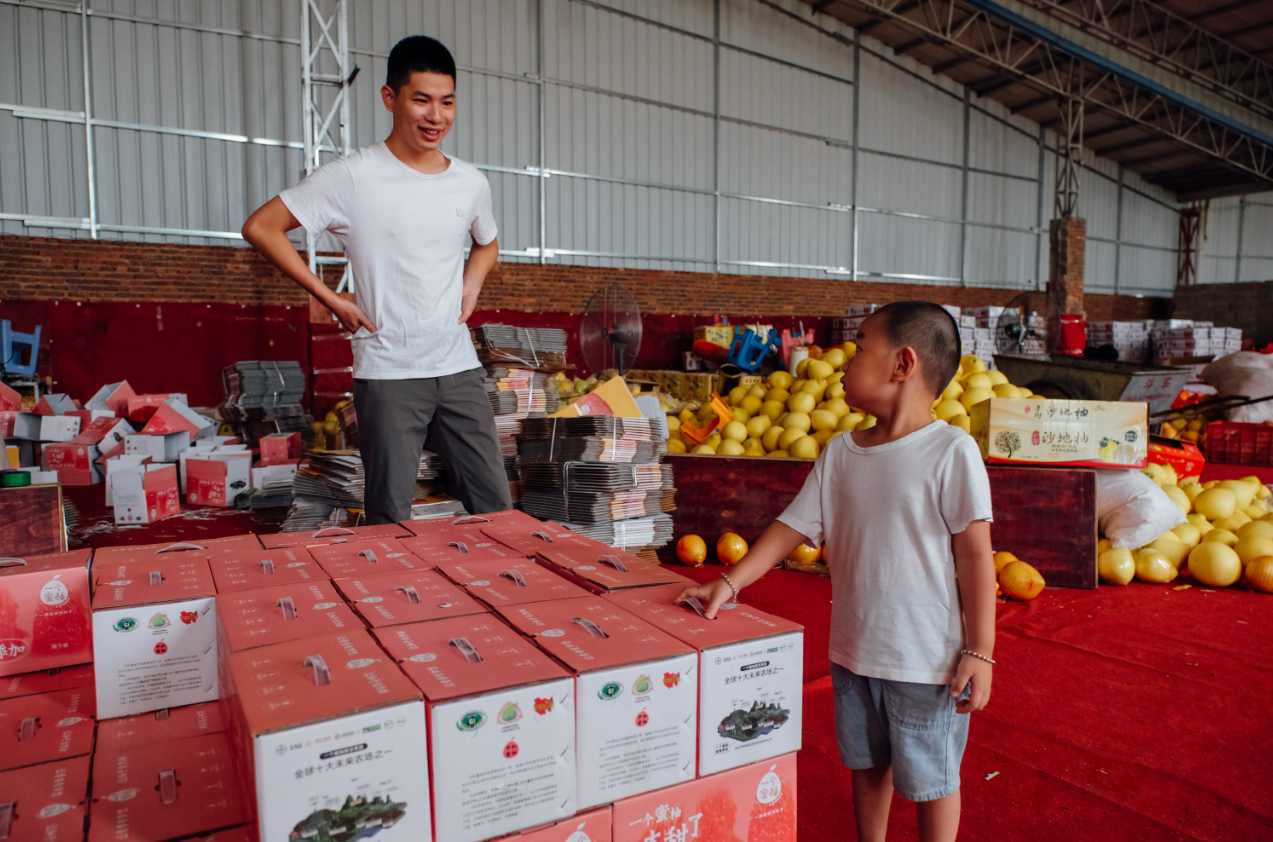
Autumn time in Pinghe town of Fujian Province, China, farm manager Chen He was busy with the harvest of pomelo in orchard. This sweet citrus fruit can be harvested only once a year. Chen must be very careful every step of the way, because that is his ‘year-round work summary and livelihood’. Unlike traditional famers who constantly worry about one’s harvest due to lack of information, Chen is well-prepared to manage his farm through modern technologies. He knows for sure this is a good year for him with a pomelo yield prediction report in hand. And having a food safety testing report as proof, he is confident enough to present his fruit to the consumers.

Building Trust between Consumers and Producers with Food Traceability
More and more farmers in China are embracing the tech advancements, utilising various intelligent devices and systems to assist farming. Among them, Chen He is one of the early adopters and making the most out of agri-tech applications.
Chen He started his brand ‘A Sweet Pomelo’ back in 2016, and now he runs an orchard of 20 hectares over several hills. Only 15% of the orchard is owned by his family, others are possessed by villagers who gradually joined Chen’s business after witnessing his success.
When pomelos being freshly picked, a sample of them will be taken for examinations of chemical residue and sweetness. Reports along with the growth records will be shared not only within the supply chain, but also to end-consumers. When someone buys Chen’s pomelo, simply by scanning a QR code, he or she will be able to know, where it is produced, when it is picked, under what climate it was grown, what has been sprayed to prevent pests and diseases, is there any residue, what’s its sweetness etc.

“Applying tech methods and devices has brought great convenience to agriculture production. I am not concerned about food safety because my products are traceable. Compared to just saying my product is good, showing people all its growth data is more straight-forward. The figures speak for themselves.” Said Chen, who obtains and analyses multiple figures in his farm management.
“Now we can quantify the quality of a produce, we describe good in more specific way rather than a vague concept. Some people might think a certain pomelo is sweet, some other might have a different opinion. With quantified data, we can say that the pomelo underwent about 10 rounds of fertilising and had proper plant protection conducted in the summer; sweetness level around 10 to 12 is the best, anything more or less than this figure will affect its taste.”
Leveraging Drones and IoT System to Power High-quality Fruit Growing
Chen He returned to Pinghe town after graduating from university in 2013. Then he worked in e-commerce for some time before taking up the manager role in his family’s orchard in 2016. Chen didn’t want to be a sealed off farmer who has low bargain power and no connection with consumers. Instead, he embraced modern tech and innovations such as drones and monitoring sensors and started the ‘A Sweet Pomelo’ brand for tech-savvy, high-quality fruit production.
To start with, Chen He brought in a team of agronomists to make treatment plans during the growing process of pomelo. Experts continuously concludes and updates the methodology on pomelo tree trimming, irrigation, fertilising and plant protection based on the change of season and climate.

“Pomelo growing has never been so scientifically supported before in our hometown even though this fruit is a local specialty. Back then, most of the farmers in our town did not have such methodologies and they only took actions after trees being damaged. But now we have more understandings about what we should do every step of the way, what work needs to be done in certain seasons and how to take precautions beforehand, thus ensuring better quality of the produce.”
Having the know-how, Chen utilises mechanical and intelligent systems to care for his orchard. This day, he is walking in between rows of trees to ensure that the pipes of the irrigation system is working properly. Chen uses the irrigation system to drop liquid fertiliser in the soils next to the root of each tree without pouring excessive water along the hill side.
“The system makes it easy to measure the amount of fertiliser applied and saves a lot of water. Of course, I can use the system for just watering the pomelo trees during dry season as well. Due to this hill terrain, it is impossible to manually water each tree.”
In springtime, Chen He regularly checks on the weather forecast in the “electronic guardian” app receiving data from XIoT Field Monitors of XAG which collect real-time meteorological data and monitor soil status in the orchard. It indicates that it is suitable time to contact local UAS plant protection team to conduct prevention sprayings.

XAG P Series Plant Protection drones come in handy for this task. The fully autonomous flying and terrain tracing on board the P Series drones make spraying fruit trees on the hills a simple job. No more dragging long tubes up on the hills by the orchard workers, or risk being poisoned spraying the chemical. Both Chen and the drone operator were just supervising the spraying from the top of the hill, while a P20 drone finishing the spray and returned to home base automatically.
Compared with taking actions after pest or disease outbreaks, prevention sprayings are actually using less chemical while also ensuring high quality fruit. “Not just that, don’t forget that the intelligent systems will record all the monitoring and spraying data, which eventually will be presented to the consumers.” Said Chen proudly with traceability being one of the biggest selling point of his pomelos.
“How do we as farm managers ensure food safety? All these data acquired are the certainty in our hearts about the food we grow. We tell that to the consumers with solid proof and great confidence.”